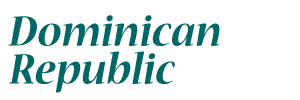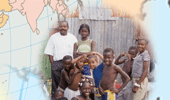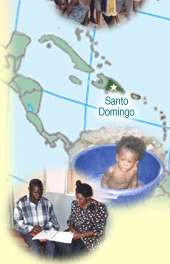
Promoting Community Health
Collaborating with the Institute for Community Action (IDAC), PRIME II began work in the fall of 2001 in seven bateyes in the province of San Pedro de Macoris. Bateyes are isolated and marginalized communities originally established to house sugar-cane workers, many of them Haitian migrants. PRIME II used traditional classroom, self-directed and peer-assisted learning approaches along with supportive radio programming to train volunteer health promoters in non-clinical family planning counseling and services, referrals, and prevention of HIV/AIDS and sexually transmitted infections. Attention to performance factors other than knowledge and skills—clarifying job expectations, giving non-financial incentives, ensuring necessary supplies and providing feedback—increased promoter learning, and this then translated into performance.
Key Results: Promoter knowledge test scores increased from 50% to 82% (n=12) and home visits in the communities rose from 219 during phase one of the project (five months) to 616 over phase two (eight months). The percentage of women surveyed in the intervention area who said they knew where to obtain FP methods increased significantly, from 57% at baseline (n=390) to 81% at final evaluation (n=391). The percentage of women surveyed who had attended at least one of the promoters’ talks about RH also grew significantly, from 40% (n=390) to 64% (n=391).
Involving Consumers in Establishing Quality Services
For ADOPLAFAM, a family planning NGO, PRIME II applied its Integrating Consumer Perspectives (ICP) approach at Centro Diagnostico, a clinic serving low-income neighborhoods on the outskirts of Santo Domingo. A series of participatory group activities collected consumer feedback about FP/RH service needs and perceived barriers to quality services. Ongoing dialogue between clinic staff and community spokespersons recognized consumer satisfaction as an essential component of the clinic’s strategy to ensure financial sustainability by providing accessible, high-quality services. Consumer feedback and information gathered using community-based tools were integrated into a quality improvement plan. Carried out with monitoring by the consumers, the plan resulted in many changes at the clinic including: greater constellation of services, longer and more convenient hours for FP services, increased privacy and improved client-provider interaction.
Key Results: Over the course of the intervention, the perception that the clinic offers necessary services increased from 50% to 97.5% and the perception that clients can ask questions of their provider increased from 31% to 62.5% (n=32, n=40). The clinic recorded an increase in paying clients from 28% to 60% in one year, and client visits increased by more than 100%.
Strengthening NGO FP/RH Services
As part of USAID/Dominican Republic’s efforts to improve the quality and accessibility of FP/RH services, clinical record-keeping and client satisfaction with services, PRIME II provided training assistance to the NGOs ADOPLAFAM and MUDE (Mujeres en Desarollo) and the Ministry of Health’s Bayaguana Regional Hospital, which accepts referrals from five primary-level clinics in the province of Monte Plata. For ADOPLAFAM and MUDE, PRIME trained more than 750 community promoters in FP/RH. Doctors and nurses affiliated with the NGOs and the hospital were trained in such areas as maternal health norms and protocols, infection prevention and supportive supervision.
Key Results: Observation scores in family planning skills and performance improved significantly for a sample of community promoters: from 44% pre-training (n=50) to 58% post-training (n=51) for MUDE promoters and from 30% pre-training (n=49) to 55% post-training (n=53) for ADOPLAFAM promoters. The training interventions at Bayaguana hospital resulted in numerous improvements at the hospital including routine counseling for FP and a friendlier environment for clients.
|











